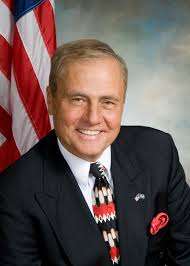New York Senate Passes Online Poker Bill
Senate Bill 3898, a bill which would legalize and regulate online poker in the state of New York, breezed through the New York State Senate Tuesday by a vote of 54-8. It is now on to the state Assembly, where it has been assigned to the Racing and Wagering Committee.

New York State Senator John Bonacic
The basics of the bill are pretty standard: players must be 21 years old or over, players must be within state borders, New York can enter into interstate gaming compacts with other states, and licensees can partner with online poker sites to utilize their software.
Eleven online poker licenses would be authorized and can be issued to operators from within the state or out of state. Operators do not have to be established New York casinos.
The initial licensing fee is $10 million and gross gaming revenue is taxed at 15 percent. Fortunately, the bill also allows for that $10 million fee to be applied to an operator’s gaming taxes.
A press release from the office of the bill’s sponsor, Senator John Bonacic, the Senate vote was celebrated:
Presently, numerous New York residents are participating in illegal, unregulated and unsafe gaming operations over the Internet. This bill will allow the state to license operators that meet the high standards set by the state while requiring such operators to protect consumers, combat compulsive gaming, and prevent minors from accessing online gaming sites.
“This bill serves two main purposes in allowing New Yorkers access to regulated online poker while providing critical consumer protections and increasing revenues to the state for education and taxes via operator licenses,” said Senator Bonacic. “I will continue to work with my colleagues in the Assembly to see that this bill passes both houses before the end of session.”
While the passage of the bill to this point is a good thing, there is a dark cloud hanging over it, at least where poker fans should be concerned. Last week, unfortunate “bad actor” language was added to S 3898, clearly aimed at PokerStars. Here is what the text looks like, describing what would make a potential operator unsuitable for licensing:
(f) Whether the applicant:
(i) has at any time, either directly, or through another person whom it owned, in whole or in significant part, or controlled:
(A) knowingly and willfully accepted or made available wagers on interactive gaming (including poker) from persons located in the United States after December thirty-first, two thousand six, unless such wager were affirmatively authorized by law of the United States or of each state in which persons making such wagers were located; or
(B) knowingly facilitated or otherwise provided services with respect to interactive gaming (including poker) involving persons located in the United States for a person described in clause (A) of this subparagraph and acted with knowledge of the fact that such wagers or interactive gaming involved persons located in the United States; or
(ii) has purchased or acquired, directly or indirectly, in whole or in significant part, a person described in subparagraph (i) of this paragraph or will use that person or a covered asset in connection with interactive gaming licensed pursuant to this article.
The cutoff date of December 31st, 2006 is the dead giveaway that PokerStars is the site in the crosshairs of this clause. The Unlawful Internet Gambling Enforcement Act of 2006 (UIGEA) was passed a couple months earlier, resulting in most online poker sites exiting the U.S. market. PokerStars remained, as did Full Tilt Poker, Absolute Poker, and UltimateBet. The other three no longer exist (Full Tilt is just a skin of Stars now), so PokerStars, by default, is the target.
So now it is on to the state Assembly, where online poker’s champion is Assemblyman J. Gary Pretlow. Interestingly, even though Pretlow has sponsored online poker bills in the Assembly in the past, he was the one who stalled out the bill last year. His reason was that he was not convinced that the online poker rooms could adequately prevent cheating and keep games limited to players within state borders.
Rather than just assuming nothing could be done, though, Pretlow did his homework. In an interview with FIOS1 News’s Andrew Whitman in February, Pretlow said he visited with New Jersey’s Attorney General to discuss how online gambling was going in the Garden State. New Jersey’s geolocation systems were demonstrated, proving that player locations could be pinpointed accurately.
Pretlow also came away satisfied that cheating – collusion, in particular – could be prevented and/or detected to a satisfactory degree. As such, he feels that online poker will work in the Assembly.
“When I do sign off on something,” Pretlow told Whitman, “my colleagues feel that it is a good deal and they don’t question why I made a certain decision. They know that if that decision was made, it’s for good reason. So I don’t really see there’s going to be much opposition to moving this along.”



















COMMENTS